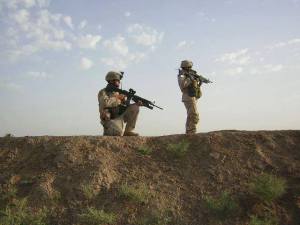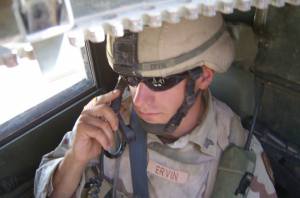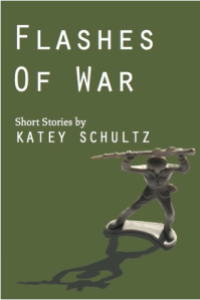Behind the Steel
by Joe Carvalko
Excerpts from my latest book of poetry, Behind the Steel, narrate military themes, not to honor or exaggerate war, but to give meaning to what men and women in service face. As writers, who have military experience, we serve an important role of observer-narrators, a tradition that has existed in Western literature for over 3,000 years. Homer crafted the epic poem Iliad in the eighth century BCE, about the Trojan War, and Julius  Caesar reported on the Gallic Wars, in the first century BCE. War themes often exemplify the dualities of grace and horror, or human virtue and vice. Against this backdrop, I have strived to convey the power of emotions of those caught in the vortex of military life on and off the battlefield. In my seventies now, I have assimilated the subject, in ways (as all of us must) that reflect my own experience: as a cold war veteran who served in a combat-ready wing, as the son of a decorated WWII infantry combatant and as an advocate that went searching for POWs lost during the Korean War. But if that summarizes my “official” connection to the topic,
Caesar reported on the Gallic Wars, in the first century BCE. War themes often exemplify the dualities of grace and horror, or human virtue and vice. Against this backdrop, I have strived to convey the power of emotions of those caught in the vortex of military life on and off the battlefield. In my seventies now, I have assimilated the subject, in ways (as all of us must) that reflect my own experience: as a cold war veteran who served in a combat-ready wing, as the son of a decorated WWII infantry combatant and as an advocate that went searching for POWs lost during the Korean War. But if that summarizes my “official” connection to the topic,  my inspiration often comes from less well-documented encounters: Mr. White, a WWI veteran who gave me his gas mask when I was about ten; my friend Pat, dead now, but who in a long rang reconnaissance patrol walked the width of Vietnam; a law partner in the ‘80s, who was committed after years battling PTSD following his service there; Lloyd Pate, POW, Camp 5 North Korea, who spoke truth to power and forced the Army to admit that after hostilities ended it left soldiers behind. I believe that as physical, spiritual and emotional beings we represent the eyes of the Universe (no other creature can do this), and as writers this obliges us to express that which otherwise would be forgotten. Here are a couple of poems from Behind the Steel:
my inspiration often comes from less well-documented encounters: Mr. White, a WWI veteran who gave me his gas mask when I was about ten; my friend Pat, dead now, but who in a long rang reconnaissance patrol walked the width of Vietnam; a law partner in the ‘80s, who was committed after years battling PTSD following his service there; Lloyd Pate, POW, Camp 5 North Korea, who spoke truth to power and forced the Army to admit that after hostilities ended it left soldiers behind. I believe that as physical, spiritual and emotional beings we represent the eyes of the Universe (no other creature can do this), and as writers this obliges us to express that which otherwise would be forgotten. Here are a couple of poems from Behind the Steel:
“ETHERING DAWN”
 In the winter of 1917, the enemies were two sides to Sisyphus pushing in opposite directions. Each side inhabited the trenches by day and at night they ventured into no man’s land, where gas, exploding shells and bullets filled the void between two sides occupying the same deadly space, each breathing the same deadly air. Yet, down to a soldier, each man differed from the other in how he internalized the fear. Each man charged forward. Each leftover retreated. Each survivor waited for the peremptory and rhetorical question “Are you ready men?” to charge again, in an endless cycle of, cold sweat, foreboding, revulsion, and abandon.
In the winter of 1917, the enemies were two sides to Sisyphus pushing in opposite directions. Each side inhabited the trenches by day and at night they ventured into no man’s land, where gas, exploding shells and bullets filled the void between two sides occupying the same deadly space, each breathing the same deadly air. Yet, down to a soldier, each man differed from the other in how he internalized the fear. Each man charged forward. Each leftover retreated. Each survivor waited for the peremptory and rhetorical question “Are you ready men?” to charge again, in an endless cycle of, cold sweat, foreboding, revulsion, and abandon.
Morning yesterday morning dew
Ethering dawn appears anew
Rolling over marshy bogs
Suspended over fallen logs
Vesicants seem ethereal
Fragrances seem funereal
Gas, gas, gas
Falling into the dark abyss
Condensing into earth’s deep kiss
Coughing puking stinking quagmire
Slimy sweat, vaporous lungs afire,
Where is the air, where is the mask
Where is the chaplain, must I ask
Gas, gas, gas
Never had a kid— or lovely wife,
Want one last gasp to harbor life
To honor burdens before I go
To raise the flag, the fife to blow
To beat the drum, to watch them fall
Face down choked, in a muddy pall
Gas, gas, gas
“FLAT AND STILL”
Lay flat and still
Follow life,
On a fallow hill
Flatted feature,
Stoic,
He too, must
Infiltrate,
Seeker of sorts who seeks a kill
Before the morning shadows fall,
Still,
In a game to gain
An unnumbered hill,
Madman’s chorale,
Songs of praise;
Neither spear nor
shot,
Innocence—,
Knows not,
His fated turn,
Rifle,
Squeezed for
mortality
Panned along a line
To define—Inside
The “V” of a bore sight,
To burden the trigger,
Springs and pivots,
Proximate cause,
A firing pin
Into the backside of a bullet
Sliding
Across a cosmos unglued by anthems—,
To fell
My fellow man,
Flat and still.



 Letters to War and Lethe is a collection of poems about war: its deprivations, its strange gifts, and its remembrances. “Whether set in Afghanistan or an American supermarket,” writes Boston-based poet Joyce Peseroff, these poems “upset platitudes and assumptions about those who fight, what they remember, and who speaks for them.” Farzana Marie’s book, Peseroff says, “is an essential addition to the literature of war and remembrance.”
Letters to War and Lethe is a collection of poems about war: its deprivations, its strange gifts, and its remembrances. “Whether set in Afghanistan or an American supermarket,” writes Boston-based poet Joyce Peseroff, these poems “upset platitudes and assumptions about those who fight, what they remember, and who speaks for them.” Farzana Marie’s book, Peseroff says, “is an essential addition to the literature of war and remembrance.” Farzana Marie is a poet and doctoral candidate at the University of Arizona, where she studies Persian Literature and Creative Writing. Farzana’s poetry has appeared in print and on-line journals including The Rusty Nail, Adanna, When Women Waken, Fourteen Hills, and Blue Streak: a Journal of Military Poetry as well as anthologies including The Heart of All That Is: Reflections on Home (Holy Cow! Press, 2013). She is also the author of the nonfiction book Hearts for Sale! A Buyer’s Guide to Winning in Afghanistan (Worldwide Writings, 2013). Farzana served over six years on active duty in the U.S. Air Force, including two consecutive years deployed in Afghanistan. She now serves as president of Civil Vision International, a nonprofit charitable organization focused on positively influencing international relationships through connecting, informing, and inspiring citizens.
Farzana Marie is a poet and doctoral candidate at the University of Arizona, where she studies Persian Literature and Creative Writing. Farzana’s poetry has appeared in print and on-line journals including The Rusty Nail, Adanna, When Women Waken, Fourteen Hills, and Blue Streak: a Journal of Military Poetry as well as anthologies including The Heart of All That Is: Reflections on Home (Holy Cow! Press, 2013). She is also the author of the nonfiction book Hearts for Sale! A Buyer’s Guide to Winning in Afghanistan (Worldwide Writings, 2013). Farzana served over six years on active duty in the U.S. Air Force, including two consecutive years deployed in Afghanistan. She now serves as president of Civil Vision International, a nonprofit charitable organization focused on positively influencing international relationships through connecting, informing, and inspiring citizens.




